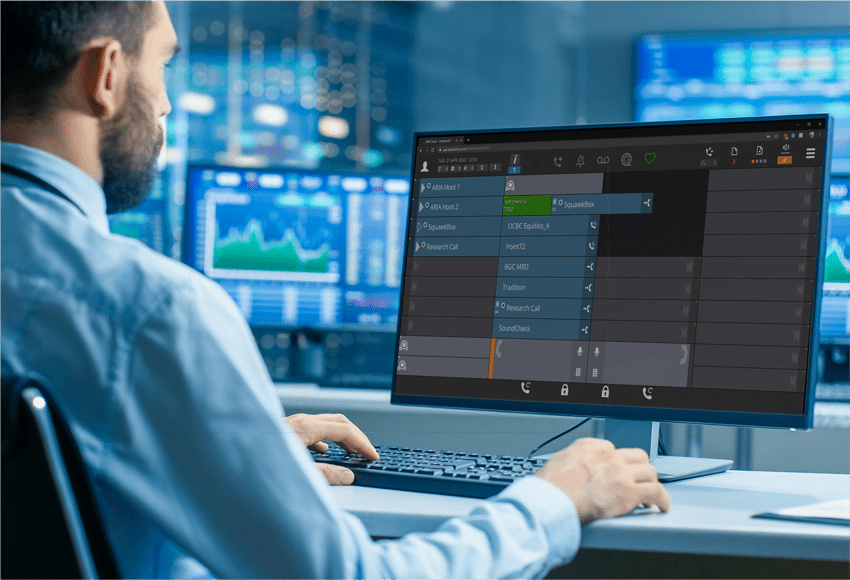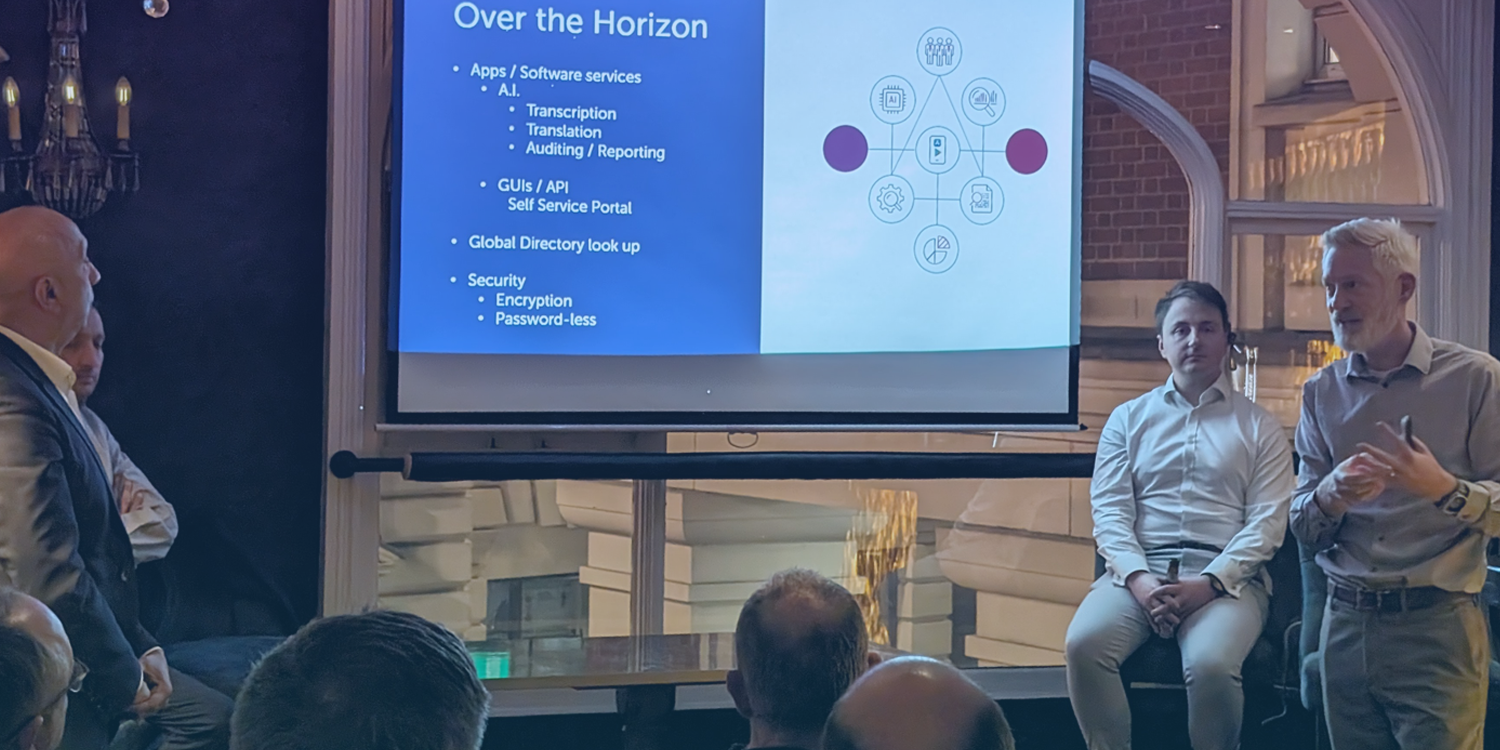
Although the Capital Markets industry has long recognised the importance of digital solutions for optimal functioning, the pandemic forced all industries to adapt to new circumstances, bringing about what’s been coined “the new normal”. Amidst these changes, heavily regulated Capital Market firms - who largely disregarded the notion of remote work prior to Covid - have found themselves lagging behind when it comes to the technical provisions needed for an efficient hybrid future, especially when it comes to trader voice technology.
Despite changes to the working environment, the trading IT infrastructure of the future needs to equip traders with the capabilities to deliver at the same pace and quality as before the pandemic. This means firms need to account for both old and new expectations from traders and their customers when assessing their digital transformation requirements.
We take a look at just how the new normal has affected trader voice infrastructure, what firms need to keep in mind when adjusting to the demands of an evolving, hybrid working world, and how to adapt tech stacks for a more efficient tomorrow.
How the pandemic and hybrid working has impacted trading firms
Despite trading volumes rising at the height of the pandemic in 2020, around 30-35% of buy and sell-side firms reported operational challenges amidst margin calls, dividend cancellations, coupon deferrals and valuation changes with their accompanying administrative requirements. This reveals that for more optimised and stable operations, inherently resistant to crises, firms need to strategically enable their operations, including trader voice functions, to balance the demands of a hybrid workforce and various industry-specific challenges, like compliance and rapid in-person trading collaboration.
In terms of individual trading activity, teams have had to adjust to new ways of working outside of the office. Although this has ensured business continuity in spite of the pandemic, it has presented traders with different kinds of process challenges to contend with. For example, no longer using dealerboards with physical switches and buttons is an obstacle to remote working adoption for some traders, as many still want the tactile feedback of more traditional devices for speed and confidence.
To support trader user preferences in the remote environment but still ensure efficient delivery, financial firms need to explore holistic hybrid solutions that offer blended interfaces and multiple communication channels, combining the accessibility of touch with the responsiveness of real buttons, no matter a trader’s tool preference.
What does the future of trader voice (voice trading) look like?
In the new normal, trader voice technology needs to meet more nuanced requirements. Trading firms are now asking different operational questions like “how do we keep our teams efficient when working outside the office?”, “how reliable is system access when working remotely” and “are trading transactions and communications as secure off-site as they are on?”. With these in mind, future-proofing internal trading processes is key to streamlined voice trading operations for firms, no matter what the future holds.
Modern trader voice solutions allow users to complete complex trades that can’t be done without the use of specific tools. Because these complex trades can’t be effectively closed using just instant messaging or automated pre-programmed trading instructions alone, modern cloud-based solutions offer precise control, clear audio and instant connections, giving teams at any point in the trading lifecycle the right tools and capabilities to be kept in the loop from anywhere.
What are the key demands for trader voice IT infrastructure in the new normal?
Though largely successful, with most firms maintaining or surpassing productivity levels despite threatened business continuity, the shift to remote working has revealed that the hybrid future of Capital Markets will require an enhanced strategic approach to make sure high-frequency, low latency trading can continue while also complying with regulatory requirements.
To ensure future success and to stay ahead of the competition, firms need to find the right, cloud-based trading communications tools, supported by the right implementation and optimisation partners. The best trader voice infrastructure aligns teams, enables collaboration, streamlines processes and ensures compliance, while also being flexible enough to adapt to change.
Mobility and flexibility
In a hybrid world, trader voice tools need to balance mobility and flexibility with performance. Cutting-edge cloud technology can provide ultra-low-latency performance, from anywhere, with security, compliance and management built-in, including end-to-end data encryption. What’s more, solutions can also centralise voice trading activity on a single platform, which can be used in the office or at home, enabling teams to perform optimally (and easily), wherever they’re working.
With public, private or hybrid cloud-based trader voice tools, firms should see on-site IT maintenance and management eased, hybrid workforce flexibility optimised and overall performance improved, leveraging all the benefits the cloud has to offer.
Continuity of user experience
Trading firms need to avoid drawing on a variety of collaboration tools to deliver blended services. This leads to problematic tech stacks with many disparate single-use solutions that can’t connect to each other or scale effectively, leaving firms with unnecessary tech expenditure and inefficient processes and trading teams struggling to adapt to multiple tools with different user interfaces.
Replicating compliant office-based systems is also an important requirement for user experience continuity, as robust solutions can mirror existing profiles and policies, minimising the need to overhaul existing infrastructure while maintaining already compliant (and familiar) tools.
Ideally, firms should opt for a single, fully integrated solution for their hybrid and remote workforce, which can consolidate costs and tools without compromising on performance while empowering teams with an all-in-one, easy-to-use platform.
Seamless trading communications
Trading in the Capital Markets has always depended on rapid communication, collaboration and visibility amongst teams, and requires quick decision-making that can be verified with confidence to keep up the pace. To maintain this in the remote working world, traders need sophisticated tools that can keep trading communications seamless.
To achieve high-frequency trading with the lowest possible latency, firms need durable trader voice solutions that can scale for seamless trading communications. Unified Communications as a Service (UCaaS) solutions offer cohesive tech stacks that are accessible to many, have built-in failure fallback and are secure and reliable. This type of virtualised infrastructure enables remote workflows while ensuring business continuity, allowing for streamlined, fully supported trading communications.
Collaboration and alignment
Besides the rapid in-person collaboration that comes with voice trading, in the traditional in-office environment, workflows and training were heavily dependent on teams being present and together in a shared space. Juniors could be mentored apprenticeship-style and seniors could conduct in-person meetings with clients to maintain interpersonal relationships and better understand client needs.
Firms need to make provisions to try and maintain this energy remotely. Although in-office time may be limited to a few days a week in a hybrid set-up, with the right tools, trading teams can still collaborate efficiently and align properly without necessarily sitting side by side in the office.
To ensure all trading team members are on the same page, the best solution offers:
- Centralised, always-on capabilities
- Scalability to support an increasing number of users as firms grow
- Agility that enables instant communication and collaboration regardless of user location
This technology solution, paired with adequate training and refined processes, can help firms achieve the same level of collaboration and alignment remotely as in the office.
Voice quality and capture accuracy
While firms (and organisations across industries) were forced to enable remote working due to the pandemic, regulatory requirements continued to evolve, especially to account for ways of working in the new normal. Directives like MiFID II and Dodd-Frank demand greater transparency on trade-related activity and how these are recorded and reported on. The FCA also requires firms to take all reasonable steps to ensure all conversations, via private wires, intercom calls and traditional phone calls, are properly recorded.
In light of these changing obligations, the ability of firms to capture trader voice data is vital. Firms need full visibility and control of their communications data by capturing, monitoring, analysing, archiving and reporting on all communications, across channels, in one place.
This capturing, aggregating and normalising of communications data is not only necessary for sound compliance, but also for updating and maintaining real-time financial modelling for better and more accurate delivery to clients.
Robust trader voice compliance
The pandemic has forced firms to modernise their tech stacks, leading to systems and processes being moved to the cloud. However, compliance in the cloud is an industry-wide concern, and security overall needs to be top of mind when it comes to how trader voice infrastructure will work in the future.
Because traders working remotely are at a greater risk of non-compliance due to not meeting the required rules for capturing and managing transactional and communications data, firms need to implement tools that can provide end-to-end encryption and be able to record and store trader voice communications in line with industry compliance requirements.
Luckily, RegTech software and cloud-based, compliance-friendly trader voice solutions are on the rise, helping firms to combat challenges like market abuse and achieve robust compliance, even if teams are working remotely.
Is it time for your firm to embrace digital transformation to ensure trader voice success?
Although most firms have fared well amidst the pandemic-induced shift to remote work, to ensure trader voice success in the new normal and beyond, firms need systems that have integration and compatibility capabilities, so that they’re easy to implement into existing workflows without increasing operational complexity or costs. Cloud-based trader voice infrastructures and RegTech solutions are ideally positioned to meet current and future remote working challenges, and firms who are fast to adopt these can distinguish themselves from competitors and build operational process resilience that enables traders to better serve clients from anywhere.
Firms may be tempted to build their own solutions like these in-house, but this requires significant investment upfront and intensive oversight and management. Additionally, many firms have accumulated a large amount of technical debt in their communications tech stacks as a result of siloed strategies, budget constraints and existing architectural limitations, which need to be dealt with through their digital transformation efforts. A more practical approach to digital transformation change management is partnering with a solutions provider that knows how best to address multiple challenges and streamline firms’ networks and tech stacks with minimal disruptions.
Summary
While digital innovation is nothing new in the Capital Markets, firms do need more sophisticated digital solutions to maintain productivity, compliance and growth in a remote working world. Keeping up with the demands of the new normal is a strategic imperative that firms need to prioritise when assessing their own digital transformation needs, as legacy systems with inefficient communication tools can hinder traders and put firm compliance at risk.
Cloud-based trader voice tools, like those offered by Speakerbus, can offer firms a holistic communications solution that includes voice, telephony, intercom, hoot and private wire functionality, providing team members with the flexibility to interact with multiple tools without worrying about compliance or processes.
To find out more about what digital transformation in the Capital markets entails, our latest Whitepaper on Exploring the Need for Digital Transformation in Capital Markets is filled with useful insights and tips to help you improve your trading IT infrastructure and streamline your tech stack.



